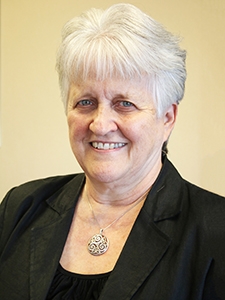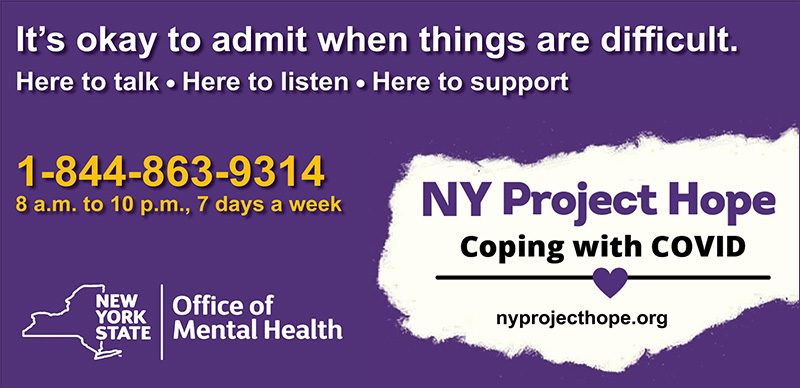Volunteers are extraordinary people who play a critical role in behavioral healthcare. This was never more evident than during the first months of the COVID-19 pandemic when the New York State Office of Mental Health (OMH) reached out to mental health care professionals and asked that they volunteer to help New Yorkers who were feeling the stress and anxiety caused by the pandemic.

Ann Sullivan, MD
Commissioner, NYS OMH
When OMH initiated our Emotional Support Helpline (1-844-863-9314) in March 2020, it was staffed solely by volunteers, including mental health professionals, who had received training in crisis counseling.
To date, the Helpline (which is now funded by FEMA and operated by NY Project Hope) has handled nearly 80,000 calls from New Yorkers seeking support. But without volunteers, we never would have been able to get the Helpline up and running. Thanks to their efforts, thousands of vulnerable people were provided with information about mental health resources available in their communities as well as tips for better managing stress, anxiety, and depression.
We also relied on volunteers for our “Coping Circles,” a first-in-the-nation program initiated by OMH to utilize telehealth technology to provide group support and therapy sessions for people who are emotionally overwhelmed by the COVID-19 crisis. Because in-person group therapy sessions were not possible during the pandemic, OMH developed Coping Circles to provide home-based support and resilience tele-groups.
Coping Circles consisted of free support and resilience group teletherapy sessions, conducted by licensed independent mental health professionals. More than 750 mental health professionals volunteered to facilitate 1,200 Coping Circles, each of which consisted of six individuals.
Thanks to the volunteers who provided their services free of charge, we were able to offer specialized group sessions for healthcare workers and first responders, people who lost loved ones to COVID-19, and people who had lost their jobs due to COVID-19.
OMH and other state employees also answered the call for volunteers and helped their fellow New Yorkers by working at COVID-19 testing sites and vaccination clinics. But volunteerism is nothing new for OMH employees, who regularly assist in the aftermath of hurricanes, flooding, and other disasters.
And although the pandemic has reduced volunteer activities at our facilities, OMH staff and patients have long benefited from the support and selflessness of volunteer groups, such as the Friends of Rochester Psychiatric Center (RPC). The “Friends” as they are affectionately called, were founded more than 45 years ago with the intent to make patients’ days a little brighter and uplift the spirits of those in the hospital. Many of the members are RPC retirees and family members of those who have received services. In the past, the Friends have helped to celebrate patients’ birthdays and provided each patient with a gift during the holidays. The Greater Binghamton Health Center (GBHC) Auxiliary has also played an important role in support of many activities for both patients and employees. The Auxiliary is made up of retired and current GBHC employees who have volunteered their time and talents to provide holiday gifts and parties, staff recognition events, field trips, summer picnics, baseball games, museum visits, park outings, and concerts, just to name a few.
At Elmira Psychiatric Center, recreation staff coordinate activities with local churches and benevolent organizations and ensure that patients receive holiday presents. Volunteers at Buffalo Psychiatric Center ran a thrift store and used the proceeds to purchase birthday and holiday presents for patients. Pilgrim Psychiatric Center enjoys the support of the Family & Friends Advisory Board, which is comprised of relatives of past and present Pilgrim Psychiatric Center patients. The Board has helped organize open house events and holiday gift distribution. This year the Family & Friends Board donated gift cards to the unit for holiday parties.
The Advisory Council at OMH’s NYC Children’s Center has been providing volunteer services and donations to children and their families for more than 40 years. Their work supports and helps provide summer activities for children, holiday gifts, and youth activities at the hospital. And the local “Camaro Club” provides a free car show and toy donation each Christmas for children in the Queens hospital. Retirees of the NYC Children’s Center have been especially generous with their time and resources.
Local churches and service organizations, such as the Lions, Elks, and Kiwanis Clubs, have also volunteered their time and resources, including to help facilitate BINGO games, pizza parties, and ice cream socials for patients at our Western NY Children’s Psychiatric Center.
In addition, our Boards of Visitors (BOV), which are composed of volunteers at our hospitals, play a key role in our effort to provide the best services possible. BOV members are appointed by the Governor and approved by the State Senate, reflect the community served by the facility, and are often family members of patients, or are themselves former patients who have expressed an active interest in the care of the vulnerable people we serve.
Every day, volunteers help thousands of individuals and families facing difficult circumstances. And, because doing good is its own reward, volunteers also benefit from their work. Giving to others can provide a sense of purpose, and can also help reduce stress, combat depression and keep you mentally stimulated. Volunteering can help people find new friends, connect with their community, learn new skills, and even advance their careers. OMH will be growing our team of volunteers at our hospitals, clinics, and residences. They can be invaluable contributors to our clients on their recovery journey.
I am so grateful to all volunteers who help OMH in its mission to provide support and assistance to vulnerable New Yorkers. I am also especially proud of the many OMH employees who regularly volunteer their services to help others. Their work, and their selfless desire to help others, has never been so important as it is today.
Dr. Ann Sullivan is the Commissioner for the New York State Office of Mental Health.







